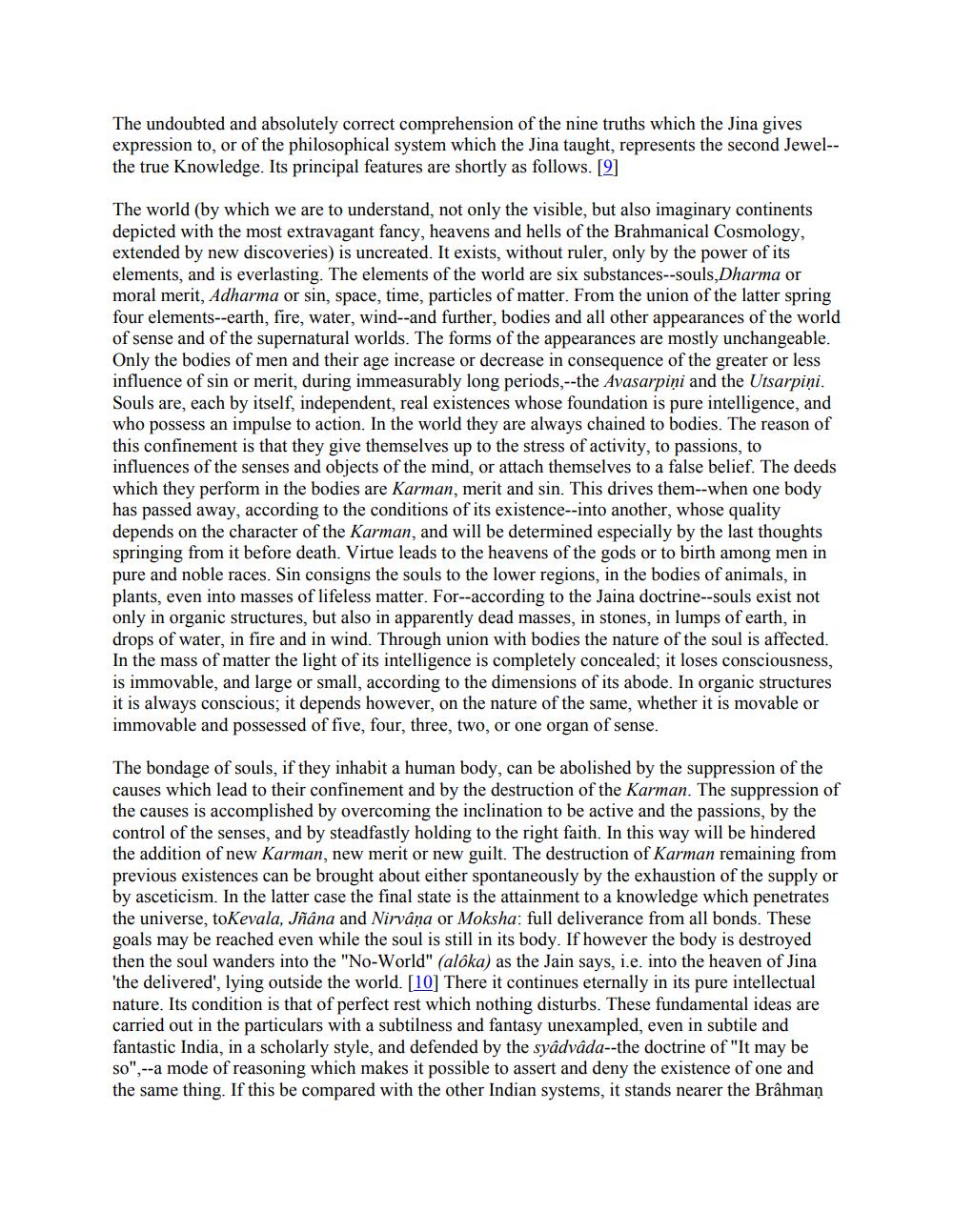Book Title: On Indian Sect of Jainas Author(s): Jas Burgess Publisher: Jas Burgess View full book textPage 5
________________ The undoubted and absolutely correct comprehension of the nine truths which the Jina gives expression to, or of the philosophical system which the Jina taught, represents the second Jewel-- the true Knowledge. Its principal features are shortly as follows. [2] The world (by which we are to understand, not only the visible, but also imaginary continents depicted with the most extravagant fancy, heavens and hells of the Brahmanical Cosmology, extended by new discoveries) is uncreated. It exists, without ruler, only by the power of its elements, and is everlasting. The elements of the world are six substances--souls,Dharma or moral merit, Adharma or sin, space, time, particles of matter. From the union of the latter spring four elements--earth, fire, water, wind--and further, bodies and all other appearances of the world of sense and of the supernatural worlds. The forms of the appearances are mostly unchangeable. Only the bodies of men and their age increase or decrease in consequence of the greater or less influence of sin or merit, during immeasurably long periods,--the Avasarpiņi and the Utsarpiņi. Souls are, each by itself, independent, real existences whose foundation is pure intelligence, and who possess an impulse to action. In the world they are always chained to bodies. The reason of this confinement is that they give themselves up to the stress of activity, to passions, to influences of the senses and objects of the mind, or attach themselves to a false belief. The deeds which they perform in the bodies are Karman, merit and sin. This drives them--when one body has passed away, according to the conditions of its existence--into another, whose quality depends on the character of the Karman, and will be determined especially by the last thoughts springing from it before death. Virtue leads to the heavens of the gods or to birth among men in pure and noble races. Sin consigns the souls to the lower regions, in the bodies of animals, in plants, even into masses of lifeless matter. For--according to the Jaina doctrine--souls exist not only in organic structures, but also in apparently dead masses, in stones, in lumps of earth, in drops of water, in fire and in wind. Through union with bodies the nature of the soul is affected. In the mass of matter the light of its intelligence is completely concealed; it loses consciousness, is immovable, and large or small, according to the dimensions of its abode. In organic structures it is always conscious; it depends however, on the nature of the same, whether it is movable or immovable and possessed of five, four, three, two, or one organ of sense. The bondage of souls, if they inhabit a human body, can be abolished by the suppression of the causes which lead to their confinement and by the destruction of the Karman. The suppression of the causes is accomplished by overcoming the inclination to be active and the passions, by the control of the senses, and by steadfastly holding to the right faith. In this way will be hindered the addition of new Karman, new merit or new guilt. The destruction of Karman remaining from previous existences can be brought about either spontaneously by the exhaustion of the supply or by asceticism. In the latter case the final state is the attainment to a knowledge which penetrates the universe, tokevala, Jñana and Nirvana or Moksha: full deliverance from all bonds. These goals may be reached even while the soul is still in its body. If however the body is destroyed then the soul wanders into the "No-World" (alóka) as the Jain says, i.e. into the heaven of Jina 'the delivered', lying outside the world. [10] There it continues eternally in its pure intellectual nature. Its condition is that of perfect rest which nothing disturbs. These fundamental ideas are carried out in the particulars with a subtilness and fantasy unexampled, even in subtile and fantastic India, in a scholarly style, and defended by the syâdvâda--the doctrine of "It may be so",--a mode of reasoning which makes it possible to assert and deny the existence of one and the same thing. If this be compared with the other Indian systems, it stands nearer the BrahmanPage Navigation
1 ... 3 4 5 6 7 8 9 10 11 12 13 14 15 16 17 18 19 20 21 22 23 24 25 26 27 28 29 30 31 32 33 34 35 36 37 38 39 40
